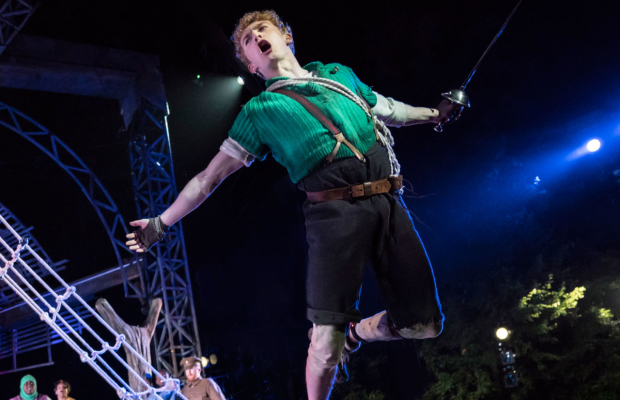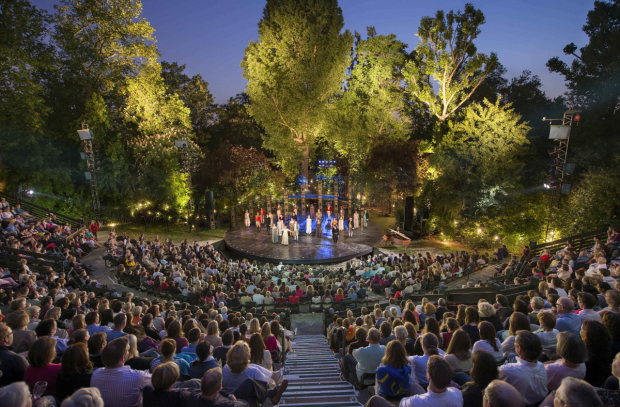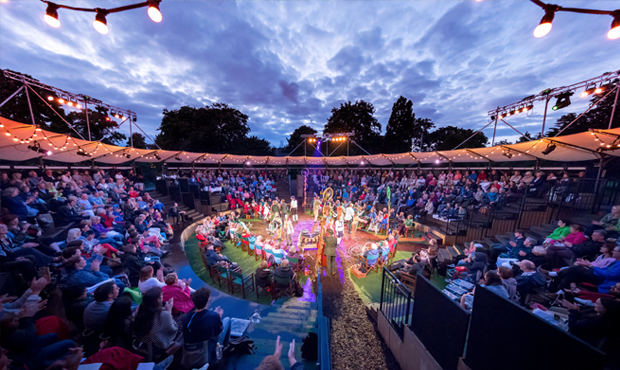Review: Peter Pan (Regent's Park Open Air Theatre)

© Johan Persson
There's Peter Pan, and there's his shadow. Timothy Sheader and Liam Steel sew the two together. JM Barrie's childhood classic comes couched in the catastrophe of the First World War that came a decade later. The Boy Who Wouldn't Grow Up becomes exactly that: not a stubborn youngster refusing adulthood, but a soldier destined to remain forever young. Never Never Land maps itself onto No Man's Land.
Instead of an elegant Edwardian nursery, we're in a bombed-out, bloodied field hospital behind the front line. Young men in uniform, rattled teenagers in bandages, lie strewn about its white metal beds: some stretched out, reading letters from home, swapping jokes; others are stretchered in, screaming. Field nurses swish from bed to bed; flirting, caring, mothering, coping. One reads to a man blinded by gas, when a rap on the window brings the story to life. Peter Pan comes to whisk these lost boys – our boys – far away.
It's a clever conceit that turns Barrie's infantile fantasy into a form of escapism – a way of shutting out the horrors of war. They're present in their absence. Every playfight with pirates or mass pillowfight is underscored by the devastation unfolding for real. It's spinny and dissociative, almost horribly happy. Sheader and Steel show us the fun these young men should be having, and let the terrors they faced sit unspoken beneath.
It feels impossibly unfair: a reminder of the children – for that's what some soldiers were – sat sodden in trenches, thinking of home. Cora Kirk's overwhelmed, overworked Wendy, still dressed for the ward, becomes the mother they long for far overseas. Sam Angell's boisterous Peter, bouncing up into the air, becomes the brave spirit each of them wishes they could be. As for Captain Hook: Dennis Herdman is a half-blind amputee officer, stalking the ward, who transforms into the demonic form of Lord Kitchener. He was, after all, the man that made them sign up: "To die", he seemed to swear, "will be an awfully big adventure".
Sheader knows his outdoor theatre needs a good show, and he never scrimps on spectacle. Outside, Peter and Co really soar through the air, bungeeing upwards as flymen take their weight, and the stage's size allows busting brawls to overspill. The vocabulary of war teases the imagination. Tinkerbell's a trench lantern with wings and little metal limbs, beautifully manipulated by Elisa de Grey, and Rachel Canning fills Never Never Land with gasmask mermaids and scrap metal swans. Her crocodile swishes a corrugated iron tail and snaps its stepladder jaw, as if it's the trenches themselves that gobble soldiers up.
For all that, the whole thing is almost entirely confused – largely because it leaves Barrie's tale intact. His story doesn't entirely sync with the setting: Hook's crew are a bizarre muddle of history's wars – vikings and conquistadors, ninjas and Romans – and the symbolism regularly gets its wires crossed. Is Peter dead or imaginary? Who's fighting who? Fact and fiction get smudged uneasily together and if it feels superficial, a neat little spin, it's because the reality of war never properly intrudes. It glances off the action, without giving way to the terror, the squalor or the sheer shock of the war. It's all a bit prim, a tad coy and the result is yet another sentimental picture of the Great War and its gallant, young heroes dying for a good cause. Is that what we need a century on? A war summed up by war songs floating through a fantasy? "Though the boys are far away, they dream of home…" Or is that a faint shadow of the reality?

















